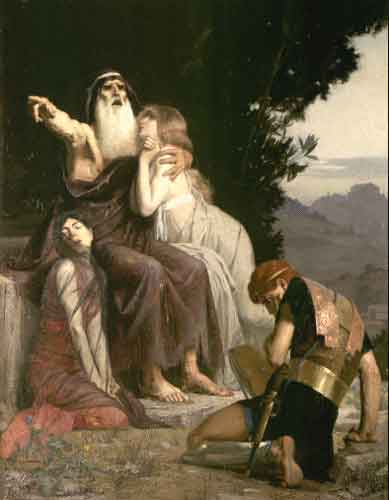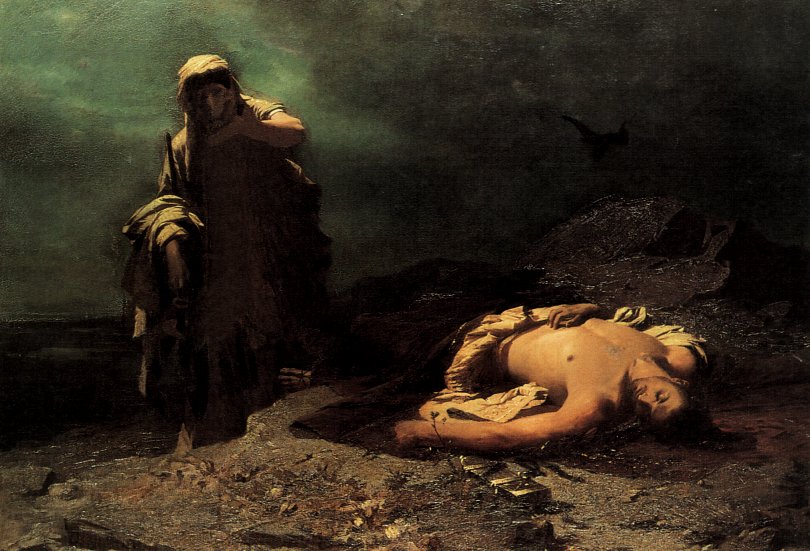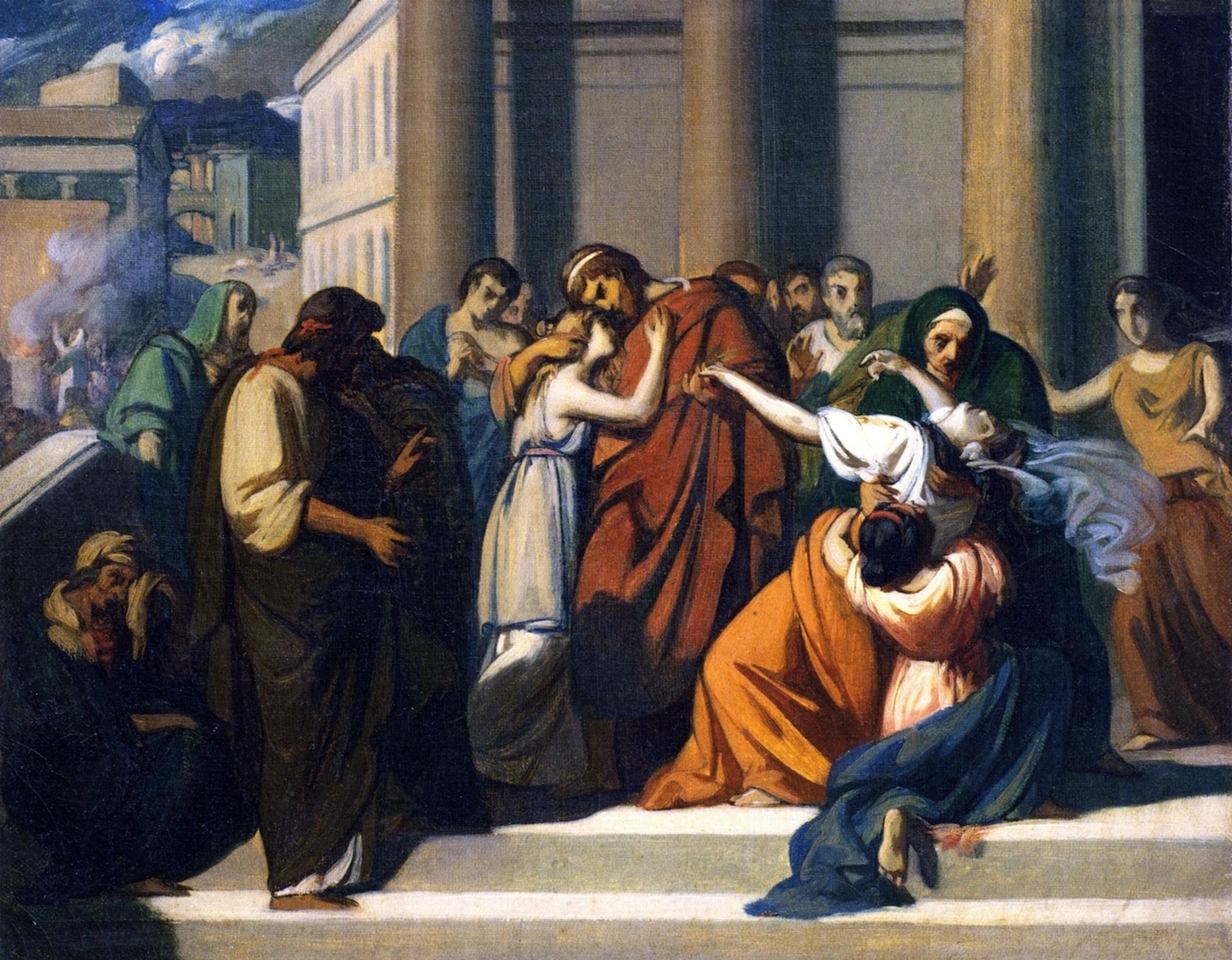|
Ismene
In Greek mythology, Ismene (; grc, Ἰσμήνη, ''Ismēnē'') is the daughter and half-sister of Oedipus, daughter and granddaughter of Jocasta, and sister of Antigone, Eteocles, and Polynices. She appears in several plays of Sophocles: at the end of ''Oedipus Rex'', in ''Oedipus at Colonus'' and in ''Antigone''. She also appears at the end of Aeschylus' ''Seven Against Thebes''. In Sophocles Oedipus Rex Ismene is not named, but is seen at the end of Oedipus Rex as her father/brother laments the "shame" and "sorrow" he is leaving her and her sister to. Oedipus begs Creon to watch over them, but in his grief reaches to take them with him as he is led away. Creon prevents him from taking his daughters out of the city with him. Oedipus at Colonus Ismene appears in Oedipus at Colonus to tell her father of the situation in Thebes and the rivalry of his sons. She explains that Eteocles has taken the throne from Polynices and driven him out of the city. As a result of this, ... [...More Info...] [...Related Items...] OR: [Wikipedia] [Google] [Baidu] |
Antigone (Sophocles)
''Antigone'' ( ; grc, Ἀντιγόνη) is an Athenian tragedy written by Sophocles in (or before) 441 BC and first performed at the Festival of Dionysus of the same year. It is thought to be the second oldest surviving play of Sophocles, preceded by ''Ajax'', which was written around the same period. The play is one of a triad of tragedies known as the three Theban plays, following ''Oedipus Rex'' and ''Oedipus at Colonus''. Even though the events in Antigone occur last in the order of events depicted in the plays, Sophocles wrote ''Antigone'' first. The story expands on the Theban legend that predates it, and it picks up where Aeschylus' ''Seven Against Thebes'' ends. The play is named after the main protagonist Antigone. After Oedipus' self-exile his sons Eteocles and Polynices engaged in a civil war for the Theban throne, which resulted in both brothers dying fighting each other. Oedipus' brother-in-law and new Theban ruler Creon ordered the public honor of Eteocles an ... [...More Info...] [...Related Items...] OR: [Wikipedia] [Google] [Baidu] |
Oedipus At Colonus
''Oedipus at Colonus'' (also ''Oedipus Coloneus''; grc, Οἰδίπους ἐπὶ Κολωνῷ, ''Oidipous epi Kolōnōi'') is the last of the three Theban plays of the Athenian tragedian Sophocles. It was written shortly before Sophocles's death in 406 BC and produced by his grandson (also called Sophocles) at the Festival of Dionysus in 401 BC. In the timeline of the plays, the events of ''Oedipus at Colonus'' occur after ''Oedipus Rex'' and before ''Antigone''; however, it was the last of Sophocles's three Theban plays to be written. The play describes the end of Oedipus's tragic life. Legends differ as to the site of Oedipus's death; Sophocles set the place at Colonus, a village near Athens and also Sophocles's own birthplace, where the blinded Oedipus has come with his daughters Antigone and Ismene as suppliants of the Erinyes and of Theseus, the king of Athens. Plot Led by Antigone, Oedipus enters the village of Colonus and sits down on a stone. They are approached b ... [...More Info...] [...Related Items...] OR: [Wikipedia] [Google] [Baidu] |
Antigone
In Greek mythology, Antigone ( ; Ancient Greek: Ἀντιγόνη) is the daughter of Oedipus and either his mother Jocasta or, in another variation of the myth, Euryganeia. She is a sister of Polynices, Eteocles, and Ismene.Roman, L., & Roman, M. (2010). The meaning of the name is, as in the case of the masculine equivalent Antigonus, "worthy of one's parents" or "in place of one's parents". She appears in the three 5th century BC tragic plays written by Sophocles, known as the three Theban plays, and she is the main protagonist of the eponymous tragedy ''Antigone''. In Sophocles The story of Antigone was addressed by the fifth-century BC Greek playwright Sophocles in his Theban plays: ''Oedipus Rex'' Antigone and her sister Ismene are seen at the end of '' Oedipus Rex'' as Oedipus laments the "shame" and "sorrow" he is leaving his daughters to. He then begs Creon to watch over them, but in his grief reaches to take them with him as he is led away. Creon prevents hi ... [...More Info...] [...Related Items...] OR: [Wikipedia] [Google] [Baidu] |
Oedipus
Oedipus (, ; grc-gre, Οἰδίπους "swollen foot") was a mythical Greek king of Thebes. A tragic hero in Greek mythology, Oedipus accidentally fulfilled a prophecy that he would end up killing his father and marrying his mother, thereby bringing disaster to his city and family. The story of Oedipus is the subject of Sophocles' tragedy '' Oedipus Rex'', which is followed in the narrative sequence by ''Oedipus at Colonus'' and then ''Antigone''. Together, these plays make up Sophocles' three Theban plays. Oedipus represents two enduring themes of Greek myth and drama: the flawed nature of humanity and an individual's role in the course of destiny in a harsh universe. In the best-known version of the myth, Oedipus was born to King Laius and Queen Jocasta of Thebes. Laius wished to thwart the prophecy, so he sent a shepherd-servant to leave Oedipus to die on a mountainside. However, the shepherd took pity on the baby and passed him to another shepherd who gave Oedipus to ... [...More Info...] [...Related Items...] OR: [Wikipedia] [Google] [Baidu] |
Mimnermus
Mimnermus ( grc-gre, Μίμνερμος ''Mímnermos'') was a Greek elegiac poet from either Colophon or Smyrna in Ionia, who flourished about 632–629 BC (i.e. in the 37th Olympiad, according to Suda). He was strongly influenced by the example of Homer, yet he wrote short poems suitable for performance at drinking parties and was remembered by ancient authorities chiefly as a love poet. Mimnermus in turn exerted a strong influence on Hellenistic poets such as Callimachus and thus also on Roman poets such as Propertius, who even preferred him to Homer for his eloquence on love themes (see Comments by other poets below). His work was collected by Alexandrian scholars in just two "books" (relatively few compared for example with the twenty-six books for Stesichorus) and today only small fragments survive. The fragments confirm the ancient estimate of him as a "consummate poet" but also indicate that he was a "sturdier character" than the indulgent love poet he was assumed to ... [...More Info...] [...Related Items...] OR: [Wikipedia] [Google] [Baidu] |
Tydeus
Tydeus (; Ancient Greek: Τυδεύς ''Tūdeus'') was an Aetolian hero in Greek mythology, belonging to the generation before the Trojan War. He was one of the Seven against Thebes, and the father of Diomedes, who is frequently known by the patronymic ''Tydides''. Life Tydeus was a son of Oeneus and either Periboea, Oeneus's second wife, or Gorge, Oeneus's daughter. He was the husband of Deipyle, the mother of Diomedes. Tydeus was banished from Calydon by his uncle Agrius, because he killed either his brother or a different uncle or six of his cousins. He travelled to Argos, where he married Deipyle, daughter of king Adrastus. Seven against Thebes Gathering of the Seven While housing Tydeus, King Adrastus of Argos also lodged Polynices, the exiled son of Oedipus who had shared the rule of Thebes with his brother Eteocles before he was expelled by the latter. Late one night, the two young exiles got into a fierce dispute over the guest room in Adrastus's palace. Awakened by ... [...More Info...] [...Related Items...] OR: [Wikipedia] [Google] [Baidu] |
Tydeus Ismene Louvre E640
Tydeus (; Ancient Greek: Τυδεύς ''Tūdeus'') was an Aetolian hero in Greek mythology, belonging to the generation before the Trojan War. He was one of the Seven against Thebes, and the father of Diomedes, who is frequently known by the patronymic ''Tydides''. Life Tydeus was a son of Oeneus and either Periboea, Oeneus's second wife, or Gorge, Oeneus's daughter. He was the husband of Deipyle, the mother of Diomedes. Tydeus was banished from Calydon by his uncle Agrius, because he killed either his brother or a different uncle or six of his cousins. He travelled to Argos, where he married Deipyle, daughter of king Adrastus. Seven against Thebes Gathering of the Seven While housing Tydeus, King Adrastus of Argos also lodged Polynices, the exiled son of Oedipus who had shared the rule of Thebes with his brother Eteocles before he was expelled by the latter. Late one night, the two young exiles got into a fierce dispute over the guest room in Adrastus's palace. Awakened by th ... [...More Info...] [...Related Items...] OR: [Wikipedia] [Google] [Baidu] |
Sophocles
Sophocles (; grc, Σοφοκλῆς, , Sophoklễs; 497/6 – winter 406/5 BC)Sommerstein (2002), p. 41. is one of three ancient Greek tragedians, at least one of whose plays has survived in full. His first plays were written later than, or contemporary with, those of Aeschylus; and earlier than, or contemporary with, those of Euripides. Sophocles wrote over 120 plays, but only seven have survived in a complete form: ''Ajax'', ''Antigone'', ''Women of Trachis'', ''Oedipus Rex'', '' Electra'', '' Philoctetes'' and ''Oedipus at Colonus''. For almost fifty years, Sophocles was the most celebrated playwright in the dramatic competitions of the city-state of Athens which took place during the religious festivals of the Lenaea and the Dionysia. He competed in thirty competitions, won twenty-four, and was never judged lower than second place. Aeschylus won thirteen competitions, and was sometimes defeated by Sophocles; Euripides won four. The most famous tragedies of Sophocles feature ... [...More Info...] [...Related Items...] OR: [Wikipedia] [Google] [Baidu] |
Oedipus Rex
''Oedipus Rex'', also known by its Greek title, ''Oedipus Tyrannus'' ( grc, Οἰδίπους Τύραννος, ), or ''Oedipus the King'', is an Athenian tragedy by Sophocles that was first performed around 429 BC. Originally, to the ancient Greeks, the title was simply ''Oedipus'' (), as it is referred to by Aristotle in the ''Poetics''. It is thought to have been renamed ''Oedipus Tyrannus'' to distinguish it from ''Oedipus at Colonus'', a later play by Sophocles. In antiquity, the term "tyrant" referred to a ruler with no legitimate claim to rule, but it did not necessarily have a negative connotation. Of Sophocles' three Theban plays that have survived, and that deal with the story of Oedipus, ''Oedipus Rex'' was the second to be written, following ''Antigone'' by about a dozen years. However, in terms of the chronology of events described by the plays, it comes first, followed by ''Oedipus at Colonus'' and then ''Antigone''. Prior to the start of ''Oedipus Rex'', Oedipus ... [...More Info...] [...Related Items...] OR: [Wikipedia] [Google] [Baidu] |
Jocasta
In Greek mythology, Jocasta (), also rendered Iocaste ( grc, Ἰοκάστη ) and also known as Epicaste (; ), was a daughter of Menoeceus, a descendant of the Spartoi Echion, and queen consort of Thebes. She was the wife of first Laius, then of their son Oedipus, and both mother and grandmother of Antigone, Eteocles, Polynices and Ismene. She was also sister of Creon and mother-in-law of Haimon. Life After his abduction and rape of Chrysippus, Laius married Jocasta. Laius received an oracle from Delphi which told him that he must not have a child with his wife, or the child would kill him and marry her; in another version, recorded by Aeschylus, Laius is warned that he can only save the city if he dies childless. One night, Laius became drunk and fathered Oedipus with Jocasta. Jocasta handed the newborn infant over to Laius. Jocasta or Laius pierced and pinned the infant's ankles together. Laius instructed his chief shepherd, Menoetes (not to be confused with Menoetes ... [...More Info...] [...Related Items...] OR: [Wikipedia] [Google] [Baidu] |
Seven Against Thebes
The Seven against Thebes were seven champions in Greek mythology who made war on Thebes. They were chosen by Adrastus, the king of Argos, to be the captains of an Argive army whose purpose was to restore Oedipus' son Polynices to the Theban throne. Adrastus, although always the leader of the expedition against Thebes, was not always counted as one of the Seven champions. Usually the Seven were Polynices, Tydeus, Amphiaraus, Capaneus, Parthenopaeus, Hippomedon, and Adrastus or Eteoclus, whenever Adrastus is excluded. They tried and failed to take Thebes, and all but Adrastus died in the attempt. On their way to Thebes, the Seven stopped at Nemea, where they held funeral games for the infant Opheltes, which became the origin of the Nemean Games. Before arriving at Thebes, Adrastus sent Tydeus on ahead to resolve the dispute through negotiation, which failed. At Thebes, Capaneus was struck down by Zeus' thunderbolt while attempting to scale the city walls. Tydeus was mortally wo ... [...More Info...] [...Related Items...] OR: [Wikipedia] [Google] [Baidu] |
Black-figure Pottery
Black-figure pottery painting, also known as the black-figure style or black-figure ceramic ( grc, , }), is one of the styles of painting on antique Greek vases. It was especially common between the 7th and 5th centuries BCE, although there are specimens dating as late as the 2nd century BCE. Stylistically it can be distinguished from the preceding orientalizing period and the subsequent red-figure pottery style. Figures and ornaments were painted on the body of the vessel using shapes and colors reminiscent of silhouettes. Delicate contours were incised into the paint before firing, and details could be reinforced and highlighted with opaque colors, usually white and red. The principal centers for this style were initially the commercial hub Corinth, and later Athens. Other important production sites are known to have been in Laconia, Boeotia, eastern Greece, and Italy. Particularly in Italy individual styles developed which were at least in part intended for the Etruscan ... [...More Info...] [...Related Items...] OR: [Wikipedia] [Google] [Baidu] |









